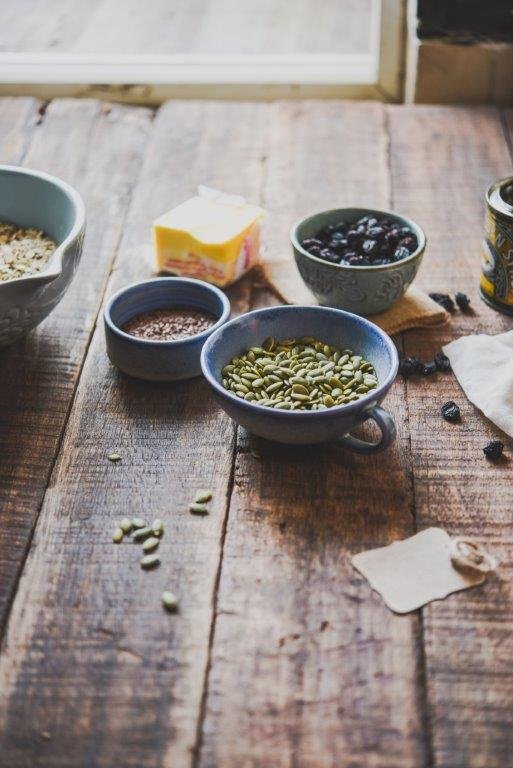Flaxseeds are little seeds produced by the flax plant. They’re available whole or ground, and they’re popular in smoothies, cereal, and baked goods. Flaxseeds provide a number of health advantages and are commonly used as a substitute for fatty foods or as a complement to a balanced diet. Many grocery shops and health food stores sell flaxseeds, and if you have enough room in your yard or garden, you may grow your own flaxseed plants.
With so many health advantages to opt from, it’s no surprise that flaxseed is becoming an increasingly popular addition to people’s everyday diets. Has something for everyone in it, from heart health to anti-aging, and you don’t have to be a vegetarian or vegan to appreciate it!

Here are Nine Flaxseed Health Benefits and Uses.
1) Improves Digestion
The oil pressed from flaxseeds can help improve your digestion, as it helps break down foods in your gut. You can add flaxseeds to smoothies, salads, cereals or yogurt. Sprinkle them on top of yogurt or oatmeal, make a salad with them or throw some into a veggie juice for a healthy dose of fiber. It’s best to consume 2-3 tablespoons of ground flaxseed daily for optimal digestion benefits.
2) Prevents Prostate Cancer
According to a study published, Nutrition and Cancer, diets high in flaxseeds can reduce prostate cancer incidence. Alpha-linolenic acid – an omega-3 fatty acid found abundantly in flaxseed – has been shown to slow down tumor growth, improve survival rates and decrease inflammation associated with prostate cancer. Other studies have also suggested that flaxseeds contain lignans, which help prevent breast cancer cell growth.
3) Reduces Blood Pressure
Heart health is one of those major benefits of flaxseed that gets most of its attention, but it’s not just heart health that stands to benefit from flax. Studies have found that regular consumption of flaxseeds can also significantly reduce blood pressure in patients. This may be attributed to its powerful fiber content, which can improve digestion as well as help regulate your blood sugar levels. (source)

4) Good for Heart Health
One tablespoon of flaxseeds contains more than 100% of your daily recommended dose of manganese, which plays a role in converting food into energy. This nutrient also helps with blood flow by aiding in digestion and boosting muscle function. Research has shown that people who eat manganese-rich foods have lower cholesterol levels than those who don’t.
5) Good for Skin Care
Thanks to its fatty acids, including linoleic acid, flaxseed can help soften your skin. Soak a cotton ball in some water with a few drops of flaxseed oil, then apply it to your face for 10 minutes before washing it off. Do it daily to improve your skin’s texture and appearance.
Read More: Home Remedies for Blocked nose
6) Helps with Weight Loss
With its concentration of healthy omega-3 fats, flaxseed can help you control your weight. Studies have shown that consuming 25 grams of ground flaxseed a day can reduce fat mass in overweight men by 10 percent. Ground flaxseeds are easy to add to your diet. Sprinkle them on cereal or add them to smoothies for an extra boost of fiber, which promotes digestive health.
7) Recommended during Pregnancy
Pregnant women should take a daily prenatal vitamin, which contains about 30 micrograms of lignans. Other sources of phytoestrogens, such as flaxseeds and sesame seeds, are also good options. Lignans may also help alleviate symptoms associated with menopause and breast cancer.

8) Protects against diabetes
Eating flaxseed regularly has been linked to a lower risk of developing diabetes. Regular consumption of flaxseeds helps your body maintain healthy blood sugar levels already within a normal range, according to a study published in Nutrition Research. While flaxseeds aren’t likely to treat diabetes, they can help keep your blood sugar levels from spiking too high after meals.
9) Promotes Healthy Hair Growth
Because flaxseeds contain lignans—phytoestrogens that fight estrogen dominance—they’re particularly beneficial for people dealing with hormonal imbalances, including female-pattern hair loss.
The seeds may also help prevent alopecia areata, an autoimmune disorder linked to a dysfunctional immune system. Just grind some flaxseeds in a coffee grinder or clean spice mill and sprinkle them over your food. A bit of ground flaxseeds goes a long way toward promoting healthy hair growth.

FAQ
What are some health benefits of flaxseeds?
Fiber, omega-3 fatty acids, manganese, phosphorus, copper, and vitamin B1 are all present in flaxseeds. A healthy diet is made up of all of these elements. Flaxseeds also improve your general health by lowering cholesterol levels and lowering your risk of heart disease.
They also assist in the reduction of high blood pressure while also delivering critical nutrients to pregnant mothers and their infants during nursing. Furthermore, they may be employed in a variety of ways. For added taste and nutrition, sprinkle them on top of yoghurt or cereal, or add them to smoothies.
Do I need to grind flax seeds?
No, unless you have a specific use in mind. Freshly ground flaxseeds will release more flavor and nutrients than whole seeds. But if you’re not using them right away, it’s just as easy to grab a bag of whole flaxseeds—they’ll keep for up to two years in an airtight container in your pantry or fridge.
What is flaxseed?
Flaxseeds, commonly known as linseeds, are little brown or golden nuts with a hard shell that grow within. They are incredibly nutrient-dense, and their exceptional health advantages have given them the label “superfood.”
These tiny fellas have been found to have over 8,000 more conceivable benefits (!!) and contain 3x more omega-3 fatty acids than salmon. By including them into your daily routine may improve your overall health.
Are there any nutritional differences between brown, golden, green, and black flaxseeds?
There are no nutritional differences between brown, golden, green, and black flaxseeds. Their taste may differ slightly because of when they’re harvested. The outer shell is removed from golden flaxseeds before they’re sold at stores or online. However, you can shell your own seeds whenever you purchase them.
How do I store my flaxseeds?
Like many whole grains, flaxseeds can become rancid quickly. To preserve their health benefits, you’ll want to store them in an airtight container in a cool, dark place. The fridge is fine, but they’ll stay fresher longer if they’re left out on your counter. Store flaxseed tightly sealed and dry at room temperature (and not in your car).
What is a good way to add ground flaxseed to my diet?

Add ground flaxseed to your diet in any number of ways. You can add it to your smoothies, you can sprinkle it on your salads or cereals, or you can make delicious muffins with ground flaxseed as an ingredient.
It’s also a good idea to keep a bottle of flaxseed oil in your kitchen for more concentrated doses. If you have health issues that may benefit from eating more flax seed, speak with your doctor first and work out a plan together before increasing dosage.
How do I use whole seeds in cooking or baking?
Although flax seeds are a whole food, they have a bitter coating that can give food a slightly unpleasant taste if you don’t remove it. To use whole flaxseeds in cooking or baking, you should grind them just before adding them to your recipe. For best results, you can also store your ground flaxseed in an airtight container in your refrigerator for up to two weeks or freeze it for about six months.
What’s a good substitute for eggs in baking recipes that call for eggs?
To add a little protein to your baking, try flaxseeds. A great alternative to eggs, these tiny seeds contain omega-3 fatty acids, which help fight against heart disease and high cholesterol while improving your skin and hair. To use flaxseeds as an egg substitute in a recipe, follow these steps: Grind 1 tablespoon of flaxseeds in a coffee grinder or food processor (whole seeds won’t work). Mix it with 3 tablespoons of water until it reaches a thin consistency.
Can I eat too much flaxseed powder or whole seeds?
Yes, you can eat too much flax. There is no recommended daily value for flax because of its health benefits, but eating excessive amounts of flax could have negative effects on your digestive system.
The recommended daily serving size is 1 to 2 tablespoons per day or 2 to 4 tablespoons a week. A serving size is about 1 tablespoon of ground seeds or 1⁄4 cup whole seeds, which provides 1 gram of fiber and 4 grams of fat (mostly healthy omega-3 fatty acids).
Conclusion
All in all, flaxseed is a great addition to your diet. Since it contains such powerful ingredients as lignans, omega-3 fatty acids, vitamins, minerals and protein, you should use it regularly. And if you’re looking for more ways to boost your overall health by incorporating flax seeds into your diet, check out these 10 amazing uses of flaxseeds for beauty.


